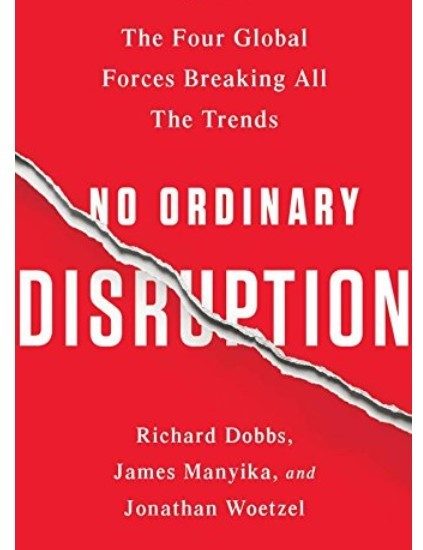Forces Transforming Our World
Display Transcript
Have you noticed that the world has been changing a lot recently? Have you wondered what the forces were behind those changes? Well, so did the authors Richard Dobbs, James Manyika, and Jonathan Woetzel. They wrote a book titled No Ordinary Disruption about four global forces that are breaking all the trends and changing the world. In that book, they discuss how everything is going to be changing around the world in the near future and beyond. This will affect everything from the global economy to how we live our daily lives. These four forces mentioned in the book are an aging world, greater global connections, rapid urbanization, and accelerating technological changes. We can already see these forces at work in the way we use social media and in how companies are running their businesses. These four forces are behind the way the world is changing to a more digital-friendly place in the process known as digital transformation. Accelerating technological changes are affecting the way we do everything from communicating with each other to shopping. For example, grocery stores are offering services where you can order your groceries online or pay as you shop, and more and more people are turning towards online shopping. There was a rapid growth in the use of social media over the past several years, and the authors see this as predicting further growth in that sector. So both in regards to social media and shopping, our personal lives are affected by accelerating technological change. In the workplace, it’s even more obvious with more businesses using cloud technology and integrating social media into their business practices. Another global force that is shaping the future of are world is a demographic shift towards an aging population. We see a lot of people growing older, and because of many factors including a lower birth rate, there won’t be as many young people to care for them. According to the authors of this book, there will be over three hundred million people over the age of 60 by the year 2050. One way digital transformation will help the aging population is through technology that provides assistance. For example, technology that is catered towards an older population might include robots that provide help with daily tasks, and other things that are designed to provide care. This will come with a shift in the way that people view growing older all over the world. People will also be in the workplace longer, and this will change the global economy. In addition to technological advancements and an aging population, another global force at work is rapid urbanization. With this, there will be more and more rural villages and small towns that are becoming urbanized. According to the book, a lot of these emerging places are in Asia and the Middle East. This will shift where the global power lies away from Europe and the United States. Digital transformation is and will be a key component of that process of urbanizing these previously less influential areas. These places are now able to contribute to the global market and economy in ways that they weren’t able to before. The authors advise being agile and flexible in response to this change, since resources might also become more expensive and leaders will have to adjust their approach to the future of their companies. This change in who’s in power will cause volatility in the market while the shift happens. The increased urbanization also ties in to the fourth global force, increased global connections. This is made possible through increased transportation and internet access around the world. All these forces that are currently shaping the world are directly the product of the ongoing digital revolution. This is why digital leadership is so important: because we need people who see this happening already, and are able to listen to these ideas, observe what is happening, react accordingly, and prompt others to do the same. These three authors wrote about what is currently shaping our futures, but it’s up to us to be prepared and lead others to a greater understanding of our world and future.

No Ordinary Disruption: The Four Global Forces Breaking All the Trends by Richard Dobbs, James Manyika, and Jonathan Woetzel is an insightful book about the way the world is about to change. The authors mention the four forces first: accelerating technological change, an aging world, the age of urbanization, and greater global connections. Then, they go on to illustrate examples and explore the possible consequences of what may happen, while also relaying what is going on right now.
As a student, this helped me see the way the world has been changing and will continue to change. It is crucially important that I learn this, since I will graduate soon and enter the workforce. It is clear that the world is changing and is about to change even more, but sometimes it is not clear exactly how. This book clarified that for me, as it analyzed the current state of our world and our global economy. I highly recommend this book.

Maggie Mize
Member of Cohort 7 of the Lockheed Martin Leadership Institute
View Biography
Maggie Mize is a computer engineering and engineering physics double major at Miami University. In addition, she has a minor in Spanish. She plans on attending grad school but is still figuring out exactly what she wants to study. She looks forward to entering the workforce and using the engineering and research skills she has learned to help people and develop new technology. She is a member of Cohort 7 in the Lockheed Martin Leadership Program at Miami University. Through this experience, she has grown in leadership skills while gaining greater awareness of her strengths and weaknesses. Overall, it has been a positive and edifying experience for her.
This year, Maggie is part of the video production team for the Digital Transformation project. On that team, she assists with captioning the videos of the students and speakers. Accessibility is an essential aspect of digital transformation, as it allows a greater amount of participation in the digital revolution and acknowledges the importance of diversity in the workplace. So the production team can stay organized, Maggie is also learning about the Agile process and putting it into practice.
